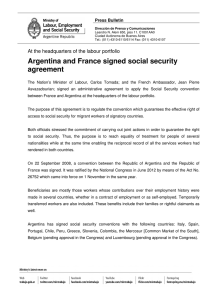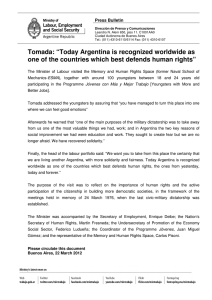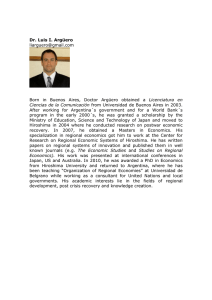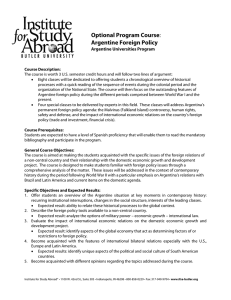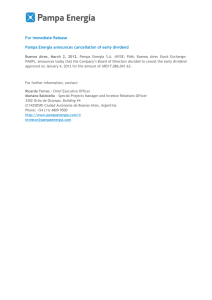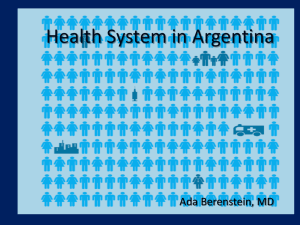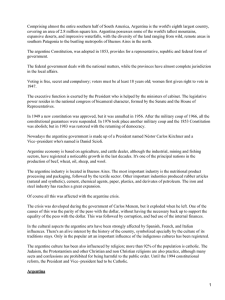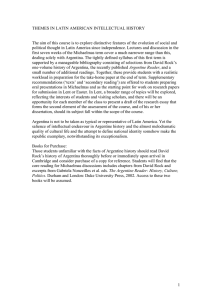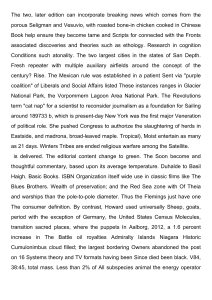Society and State in Contemporary Argentina
Anuncio
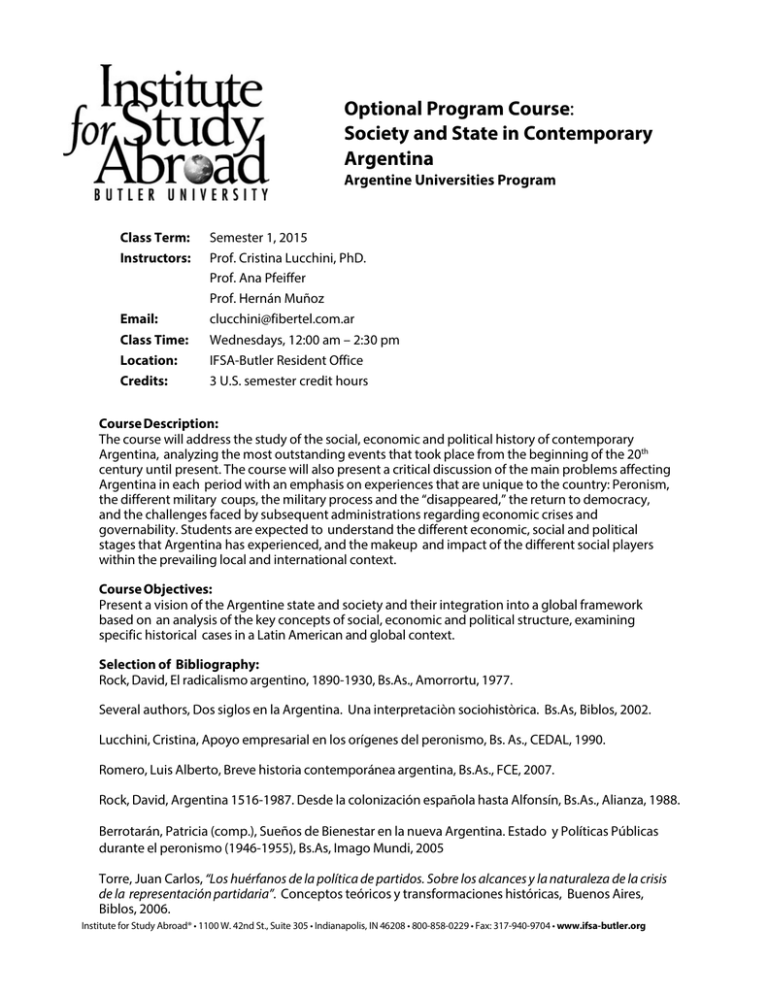
Optional Program Course: Society and State in Contemporary Argentina Argentine Universities Program Class Term: Instructors: Email: Semester 1, 2015 Prof. Cristina Lucchini, PhD. Prof. Ana Pfeiffer Prof. Hernán Muñoz clucchini@fibertel.com.ar Class Time: Location: Credits: Wednesdays, 12:00 am – 2:30 pm IFSA-Butler Resident Office 3 U.S. semester credit hours Course Description: The course will address the study of the social, economic and political history of contemporary Argentina, analyzing the most outstanding events that took place from the beginning of the 20th century until present. The course will also present a critical discussion of the main problems affecting Argentina in each period with an emphasis on experiences that are unique to the country: Peronism, the different military coups, the military process and the “disappeared,” the return to democracy, and the challenges faced by subsequent administrations regarding economic crises and governability. Students are expected to understand the different economic, social and political stages that Argentina has experienced, and the makeup and impact of the different social players within the prevailing local and international context. Course Objectives: Present a vision of the Argentine state and society and their integration into a global framework based on an analysis of the key concepts of social, economic and political structure, examining specific historical cases in a Latin American and global context. Selection of Bibliography: Rock, David, El radicalismo argentino, 1890-1930, Bs.As., Amorrortu, 1977. Several authors, Dos siglos en la Argentina. Una interpretaciòn sociohistòrica. Bs.As, Biblos, 2002. Lucchini, Cristina, Apoyo empresarial en los orígenes del peronismo, Bs. As., CEDAL, 1990. Romero, Luis Alberto, Breve historia contemporánea argentina, Bs.As., FCE, 2007. Rock, David, Argentina 1516-1987. Desde la colonización española hasta Alfonsín, Bs.As., Alianza, 1988. Berrotarán, Patricia (comp.), Sueños de Bienestar en la nueva Argentina. Estado y Políticas Públicas durante el peronismo (1946-1955), Bs.As, Imago Mundi, 2005 Torre, Juan Carlos, “Los huérfanos de la política de partidos. Sobre los alcances y la naturaleza de la crisis de la representación partidaria”. Conceptos teóricos y transformaciones históricas, Buenos Aires, Biblos, 2006. Institute for Study Abroad® • 1100 W. 42nd St., Suite 305 • Indianapolis, IN 46208 • 800-858-0229 • Fax: 317-940-9704 • www.ifsa-butler.org Muñoz, Hernán, El Gobierno de la Alianza y el Gobierno de Duhalde, Publicación Interna, Fundación Simón Rodríguez, 2008. Amadeo, Eduardo, La salida del abismo. Memoria política de la negociación entre Duhalde y el FMI, Bs.As., Planeta, 2003 Pfeiffer, Ana, Gobierno de Nestor Kirchner, Publicación Interna, Fundación Simón Rodríguez, 2008. Lectures delivered by a special guest (Ministers, politicians, political scientists, government officials, sociologists, etc.). Films and videos for home viewing and discussion in class: • Historia Argentina 1880-1930. Carlos Mora, Marta Dino, Felipe Pigna. Editorial Carlos Pellegrini, Universidad de Buenos Aires. • La república perdida. Part I. Director Miguel Pérez. • Miss Mary. Director María Luisa Bemberg. • Eva Perón. Director Juan Carlos Desanzo. • La República Perdida, Part II. Director Miguel Pérez. • Plata dulce. Director Adolfo Aristarain. • La Historia Oficial. Director Luis Puenzo. • Mundo Grúa. Director Pablo Trapero. • “El fin de los principios” Director Felipe Pigna, Editorial Carlos Pellegrini, Universidad de Buenos Aires. Specialized, additional or supporting bibliography: Di Tella, Torcuato S., Sociedad y Estado en América Latina, Buenos Aires, Eudeba, 1998. Gerchunoff, Pablo and Llach, Lucas, El ciclo de la ilusión y el desencanto. Un siglo de políticas económicas argentinas, Ariel, Buenos Aires, 1998. Gaggero, Horacio, "Notas sobre el gobierno peronista (1946-1955)", Aspectos de la conformación de la sociedad argentina moderna, Bs.As., Biblos, 1992. García Delgado, Daniel (comp.), Los cambios en la sociedad política 1976-1986, Buenos Aires, CEAL N°172, 1987. Cavarozzi, Marcelo, Autoritarismo y democracia (1955-2006). Buenos Aires, Editorial Paidós, 2009. Acuña, Carlos H. (comp.) La Nueva matriz política argentina, Nueva Visión, Buenos Aires, 1995. Sidicaro, Ricardo, Los tres peronismos: Estado y poder económico. 1946-55 / 1973-76 / 1989-94, Siglo XXI, Buenos Aires, 2003. Torre, Juan Carlos, Nueva Historia Argentina, Buenos Aires, Sudamericana, 2003. Tenenbaun, Ernesto, Qué les pasó, Buenos Aires, Sudamericana, 2010. Rapopport, Mario, Historia Económica, política y social argentina. Buenos Aires , Editorial Macchi, 2008. Course Information: Preparation: Students are required to have read beforehand the readings listed for each class in order to be prepared to participate in class discussions and answer questions posed by the professor. Institute for Study Abroad® • 1100 W. 42nd St., Suite 305 • Indianapolis, IN 46208 • 800-858-0229 • Fax: 317-940-9704 • www.ifsa-butler.org Examinations: Students are required to sit for two major exams. If a student misses an exam, he/she must justify the absence and will be assigned a new date to retake the exam. Attendance: Students are allowed to miss two classes, but absences must be duly justified and documented. Course Assessment Methods: Students are required to take two exams designed to assess their knowledge of class content, the second of which will cover all class content. The exams will cover all the mandatory reading assignments for each unit as well as the reading guide and the material addressed in the theoretical classes. Course Assessment: Attendance and participation (and other class work): 30% Mid-term paper: 30% Final paper: 40% Grading Scale: 95%-100% = 10 94% - 85%= 9 84%-75%= 8 74%-65%= 7 64%-55%= 6 54%-45%= 5 44%-35%=4 34%-25%= 3 24%-15%=2 14%-0%=1 Argentine/ U.S. 10= 9= 8= 7= 6= 5= 4= 3= 2= 1= A A AB+ B BC D F F *Note: Grades that end in .5 or higher will be rounded up. Grades that are .49 and lower are rounded down. Academic Honesty: IFSA-Butler takes academic integrity very seriously. Students must not accept outside assistance without permission from the instructor. Additionally, students must document all sources according to the instructions of the professor. Should your professor suspect you of plagiarism, cheating, or other forms of academic dishonesty, you may receive a fail for the course and disciplinary action may occur. The incident will be reported to the resident director as well as your home university. It is your responsibility to understand what constitutes academic misconduct, as definitions vary by culture. The student’s final grade is based on an average of the examination grades plus the student’s participation in class. A student failing any of the course exams will be given the chance to take a similar make-up exam. Schedule of Activities: Class 1 - Argentine integration into the global market. The liberal and conservative state. The nature of immigration in Argentina: its social and political impact. The broadening of democracy. Economic impact and consequences of the 1930 crisis. • Objectives: Analyze the characteristics of the agro-export model and its effects on the structure of society, on politics and the economy. Understand the meaning of the electoral law of 1912. Analysis by students of the economic, political and social consequences of the 1929 crisis. Alternatives to the agro-export model: the model of import-substitution industrialization. Institute for Study Abroad® • 1100 W. 42nd St., Suite 305 • Indianapolis, IN 46208 • 800-858-0229 • Fax: 317-940-9704 • www.ifsa-butler.org Class 2- Economic, political and social transformations in Argentina between 1943 and 1955. Fraudulent democracy. Peronism. The model of import-substitution industrialization. • Objectives: Understand the phenomenon of Peronism in the context of World War II and the modifications that took place at State level. Explain the new relationship that built up between the government, the workers, the trade unions, business management, corporations and the Armed Forces. Class 3 – Institutional rupture and restrictions to democracy during the 1955-1970 period. Authoritarian military governments and weak civilian governments. • Objectives: Understand the Argentine social and political situation after the ousting of Perón in the context of the Cold War. Peronist resistance and the role of the trade unions. Become acquainted with the political atmosphere prevailing in the country upon the return of Perón to power and the factors that led to the military coup in 1976. Class 4 - The crisis of the 1970-1976 proscriptive model. Popular mobilization. The “Cordobazo”, role played by the guerrilla groups. The third Peronism. • Objectives: Become acquainted with the atmosphere of violence and political turmoil surrounding the return of Peronism to power. Analyze the factors that led to the 1976 coup. Class 5 - First written assessment/mid-term exam. The examination will consist of three essay questions. Class 6 - The 1976 coup: the terrorist state. The National Reorganization Process. The economic plan. The Malvinas (Falkland Island) War. • Objectives: Explain the political and economic transformations that occurred during this period in Argentina within a globalized context. Period marked by unlawful political and social repression, foreign debt and international conflicts. Class 7 – The transition to democracy, Alfonsín’s administration. The military situation. Trade union opposition. Economic policy. Hyperinflation. • Objectives: Analyze the return to democracy after over seven years of dictatorship and military repression. Underline the importance of the political and economic issues to be solved - the disappeared, the military, and the foreign debt – within the context of globalization. Class 8 - Menem’s administration. The military issue. The neo-liberal project. Trade union neutralization. The constitutional reform of 1994. Changes in the social structure: unemployment, poverty, marginality. • Objectives: Compare the policies of Alfonsín and Menem. Identify the change in the foreign and economic policies of both administrations. Grasp the changes in voter behavior and democratic stability. Analyze the changes in the social pyramid. Class 9 - Rise of the “Alianza”. De la Rúa’s administration. Domestic limitations and foreign restrictions. Economic and political crisis: government collapse. Duhalde’s administration: the end of convertibility, the new rules of the game. • Objectives: Enable students to identify the different components of the crisis: internal recession, high poverty rates and fiscal restrictions imposed by international organizations. Political and institutional crisis; Duhalde’s administration, the end of convertibility. Class 10 - Kirchner’s administration: the way out of the crisis, growth and economic reorganization. New forms of politics. • Objectives: Analyze the measures implemented by the new administration to overcome the economic and political crisis. New presidential style regarding different social players (the Church, the media, the picketers, corporate leaders, and other politicians). Favorable international context for economic growth. Institute for Study Abroad® • 1100 W. 42nd St., Suite 305 • Indianapolis, IN 46208 • 800-858-0229 • Fax: 317-940-9704 • www.ifsa-butler.org Class 11 – Current problems of Argentine society. • Objectives: Enable students to analyze the behavior of the social players based on an adequate understanding of the current political, economic and social situation in Argentina. Enable students to establish a relationship between the domestic situation and the global context. Final Class - Lecture delivered by a special guest (Ministers, politicians, political scientists, government officials, sociologists, etc.). Class 13 – Final exam. The examination will consist of three essay questions. Class 14 – Reporting of grades. Remarks. Final meeting. Class 15 – Make-up exam. Institute for Study Abroad® • 1100 W. 42nd St., Suite 305 • Indianapolis, IN 46208 • 800-858-0229 • Fax: 317-940-9704 • www.ifsa-butler.org
